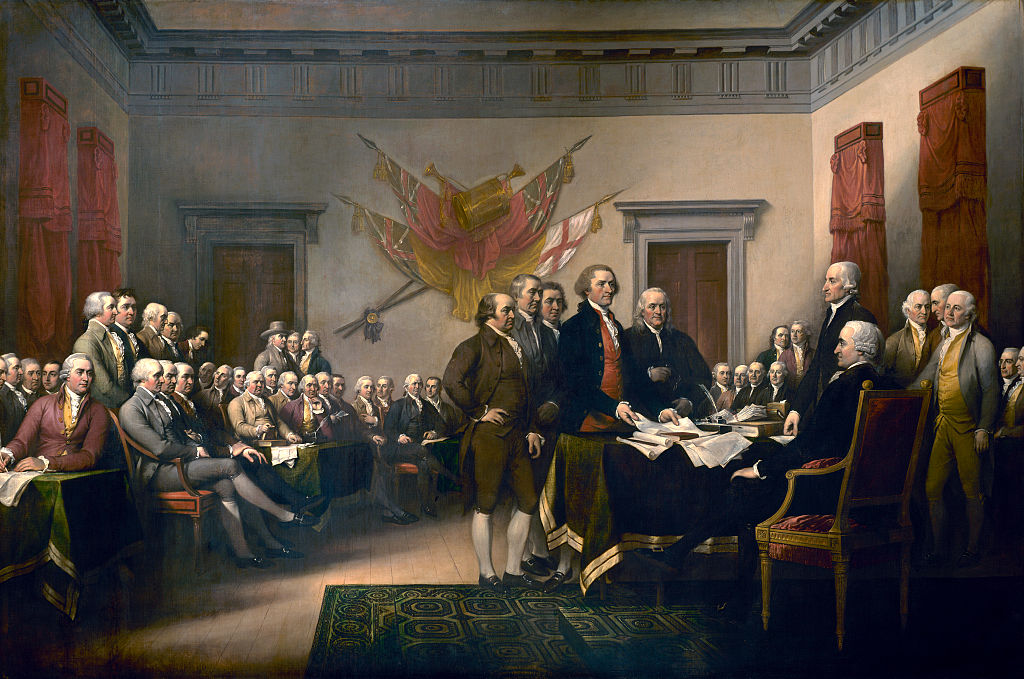
In 1776, as they lined up in Philadelphia to sign the Declaration of Independence, the Founders attested quite literally to its final words, “We pledge our lives, our fortunes and our sacred honor.” What exactly were their fortunes?
A little over a century ago, Columbia University professor Charles A. Beard asserted that all the Founders were rich and in it for the money. But does Beard’s analysis hold up in the light of a modern investigation using financial records he did not possess?
Examination of the Founders’ lives and their gains and losses through three turbulent decades of breaking away from Great Britain and building a new nation provides a much more nuanced picture.
Some of the Founders were not rich. Samuel Adams, who first raised the alarm of growing Parliamentary pocket-picking of American colonists—“taxation without representation is tyranny”—was born to a Boston malt merchant who tried to set up a mortgage bank. The British not only shut it down but ordered the elder Adams to repay all the loans, bankrupting him. He could no longer afford his son’s expenses at Harvard. The future revolutionary wound up waiting on the tables of his wealthier friends— and hating the British.
His friend, John Hancock, born the son of an impecunious country parson, was adopted by his childless uncle, probably the richest merchant in New England. After completing Harvard, young Hancock learned the whale oil exporting business, at 26 taking over the firm and diversifying it by creating a network of stores and ships that made him even wealthier.
The two men became the leaders of resistance to Britain’s tax policies, and when they fled British troops searching for them in Lexington, Hancock crammed the family fortune into a carriage to invest in the revolution. Turning to the chronically-disheveled Adams, he said, “You can’t go to Congress looking like that.” And bought him a new suit.
The first of the grievances enumerated in the Declaration of Independence was that Britain had banned all banks and colonial currencies. While James Madison, son of a wealthy planter, took his seat in Congress, his horse was evicted from a stable nearby. Philadelphians would not accept Virginia currency.
For the Second Continental Congress, George Washington arrived in a coach drawn by matched horses with liveried outriders. As the threadbare son of a thrice-widowed single mother, he could not afford dancing lessons—the ticket to Tidewater society— and had to borrow a horse to ride off to fight in the French and Indian War.
But that soon changed when after five years of frontier warfare, he married the colony’s wealthiest widow. As the British continued to impose hefty taxes, Washington had to turn to British brokers and bankers and slid into debt. Studying his records, he calculated that the British government and bankers were taking seventy-five percent of his profits.
Chosen unanimously by Congress as commander-in-chief of Continental forces, he refused a salary, asking only to be reimbursed his documented expenses. During the eight-year-long struggle, he lost half his wealth, largely because he neglected his farms. He received no pension. Like most of the Founders, Washington was rich in land and slaves but cash poor. In a long postwar depression, he couldn’t sell or rent his lands.
Robert Morris, generally considered the financier of the Revolution, donated ships from his fleet of tobacco-trading vessels and turned to privateering. Raiding British convoys, he became the richest man in America. He personally signed 6,000 notes to pay off Washington’s troops when the war ended.
The quintessential rags-to-riches story was Benjamin Franklin’s, and he wrote it himself in his famous autobiography. Arriving in Philadelphia a seventeen-year-old runaway, he used his printer’s skills to launch a newspaper, publish books, and sell them through partnerships with printers in other towns. He invested his profits in real estate, accruing 89 rental properties.
Sent to Paris as America’s first ambassador, he sought arms and loans. British troops occupying Philadelphia trashed Franklin’s properties and looted his house. But in France Franklin was the king’s favorite American. When Franklin said goodbye at Versailles, Louis XVI ordered that he be given a special gift, a snuff box bearing the king’s portrait, encrusted with 401 diamonds.
Franklin’s successor, Thomas Jefferson, a compulsive shopper, married the daughter of a slave trader, inheriting his fortune and his debts. Jefferson went on a fifty-year spending spree, furnishing his mountaintop mansion with art and artifacts from London and Paris.
Wartime governor of Virginia, Jefferson allowed friends to pay their debts in virtually worthless Continental currency, but he still owed ever-increasing debts to British brokers in pounds sterling. The British army had trashed one of his farms; Jefferson made this his excuse not to repay them.
Postwar British restrictions on the U.S. cut off trade to the Caribbean and Canada; British merchants cut off credit. Nobody had any money. Foolishly, Robert Morris turned to speculating in land, but nobody could buy it. Hounded by creditors, he surrendered to Philadelphia’s sheriffs and spent three years in debtor’s prison, one of three signers whose fortunes tanked.
Alexander Hamilton, who created the financial system of the U.S., was so broke when he died in a duel that his friends had to take up a collection for his funeral.
It was Robert Morris who most succinctly challenged Charles Beard’s hypothesis. His Founding colleagues were, he wrote, “plain honest men.”
More Must-Reads from TIME
- Why Biden Dropped Out
- Ukraine’s Plan to Survive Trump
- The Rise of a New Kind of Parenting Guru
- The Chaos and Commotion of the RNC in Photos
- Why We All Have a Stake in Twisters’ Success
- 8 Eating Habits That Actually Improve Your Sleep
- Welcome to the Noah Lyles Olympics
- Get Our Paris Olympics Newsletter in Your Inbox
Contact us at letters@time.com